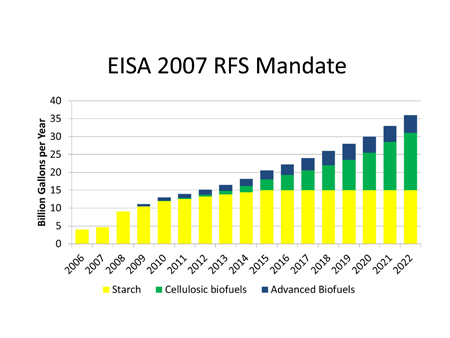Federal law determines how much renewable fuel is produced
The Energy Independence and Security Act of 2007 has been the policy driver behind the biofuels industry and will continue through 2022
The Energy Independence and Security Act (EISA) of 2007 was a milestone in U.S. energy policy. It solidified previous movements toward renewable energy by expanding the Renewable Fuels Standard (RFS) to 25 percent of the United States current petroleum consumption – 36 billion gallons of ethanol – by the year 2022. The RFS was expanded to include 15 billion gallons of ethanol from starch and sugar based feedstocks (corn, sugarcane), 16 billion gallons from cellulosic feedstocks (corn stover, switchgrass, woody plants) and 5 billion gallons from advanced biofuels (see Figure 1). The biggest challenge ahead lies in development of technology and discovery of new processes that will make the conversion of biomass to ethanol more efficient and profitable.
Figure 1. Breakdown of the Renewable Fuels Standard. This is the amount of biofuels required by law to be blended into the US transportation fuel supply stream each year.

Biomass is all parts of any type of plant, including the leaves and stems, not just the starch and sugars. All plant cells contain cellulose, hemicellulose and lignin in the cell walls. Cellulose and hemicellulose are made up of linear and branched chains of sugars. Plant cell walls can be broken down, the cellulose and hemicellulose exposed and then converted into basic sugars. The sugars can then be fermented into ethanol and other biobased products, similar to corn ethanol. Conversion rates for different processes and feedstocks vary tremendously. It is estimated that it will take 1 billion tons of biomass per year to produce 21 billion gallons of ethanol. While this goal seems lofty, it is quite realistic, although it will require a diverse portfolio of products.
For more information contact Dennis Pennington (pennin34@msu.edu) at 269-838-8265 or on the web at http://bioenergy.msu.edu.



 Print
Print Email
Email

